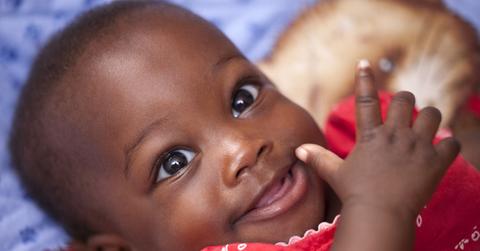Parents Can't Hold Their Babies Too Much, According To New Study
Many new parents are on the fence about how much they should hold their babies, concerned about how much attention is too much. According to a recent report, it appears that the more you hold your baby, the better is it for their development.
Updated May 26 2019, 3:46 p.m. ET
Every new parent has that one friend or relative who tells them they spoil their baby too much. Too much holding or cuddling of your baby has gotten a bad reputation over the years, and is sometimes blamed for a child's bad behavior, such as crying in public or throwing a temper tantrum. Advocates for “self-soothing” often claim that babies should be left to cry out their feelings, so they learn the ability to soothe themselves and not become dependent on a parent or caregiver to help them regulate their emotions.
Luckily for the holdouts, science is on your side. A recently study corroborates what some people have felt all along: You can’t hold your baby too much. In fact, the more cuddles, the better.
Researchers at Nationwide Children's Hospital in Ohio observed 125 babies born between 24 and 42 weeks gestation. Babies were attached to an EEG (electroencephalogram) which allowed their brain activity to be monitored and recorded. For this study, they were exposed to a gentle puff of air, as well as a "fake" puff, and their brain responses were measured by researchers.
They determined that babies born before 38 weeks gestation showed less brain response to gentle touch than full-term babies, but for NICU babies, time spent in direct contact with parents and caregivers correlated with a stronger brain response than those who received less gentle touch. Further, newborns who experienced painful procedures showed decreased response to gentle touch, despite the use of analgesics and sugar during procedures.
"We certainly hoped to see that more positive touch experiences in the hospital would help babies have a more typical perception of touch when they went home," says lead researcher, Nathalie Maitre. "But, we were very surprised to find out that if babies experience more painful procedures early in life, their sense of gentle touch can be affected."
"Making sure that preterm babies receive positive, supportive touch such as skin-to-skin care by parents is essential to help their brains respond to gentle touch in ways similar to those of babies who experienced an entire pregnancy inside their mother's womb," says Maitre. "When parents cannot do this, hospitals may want to consider occupational and physical therapists to provide a carefully planned touch experience, sometimes missing from a hospital setting.
The study concluded that gentle touch, like skin-to-skin or kangaroo care, is integral to healthy brain development in both preterm and full-term babies, and that preemies who spend time in NICU benefit from frequent gentle touch as part of their regular care. So parents and caregivers, don't be afraid to hold your babies!
